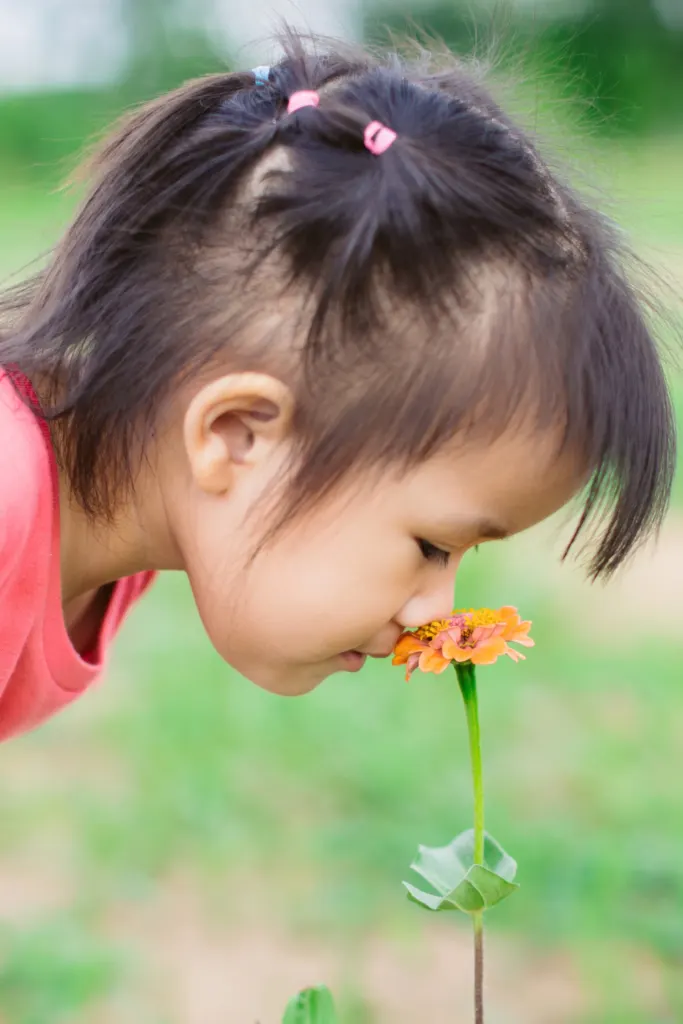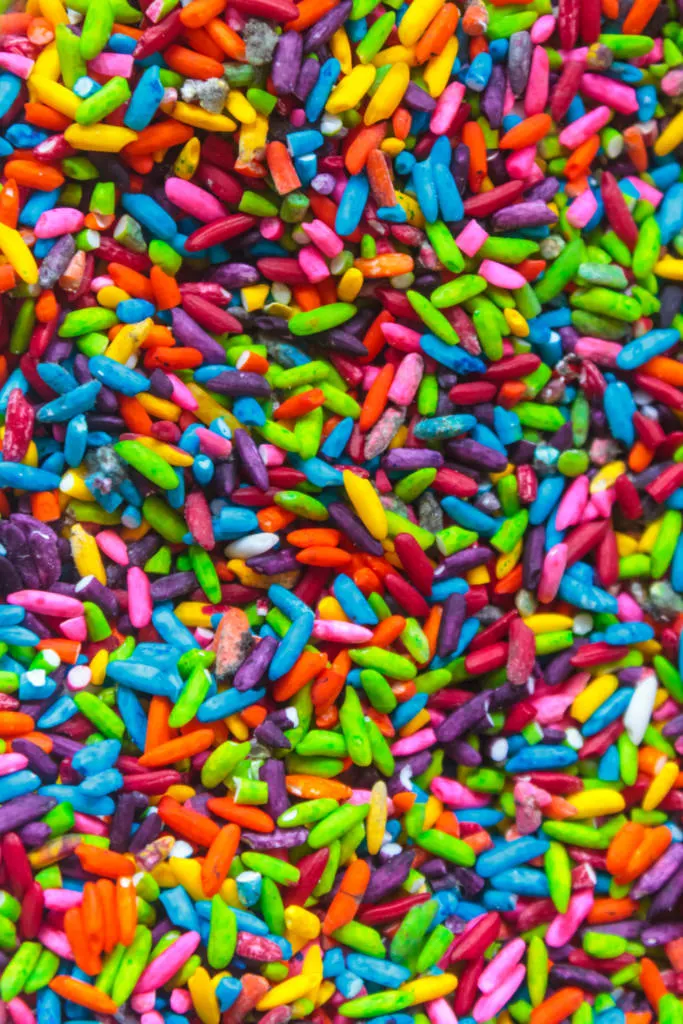
Are you looking for new ways to enhance your child’s sensory experience?
One often overlooked sense is smell.
Our sense of smell is closely linked to our memories and emotions, and can greatly affect our mood.
Incorporating sensory smell ideas into your daily routine can have a positive impact on your overall well-being.
There are many ways to incorporate sensory smell ideas into your child’s life.
One simple way is to use essential oils. Essential oils can be diffused, applied topically, or added to a bath.
Each oil has its own unique scent and benefits.
Some popular oils include lavender for relaxation, peppermint for energy, and eucalyptus for respiratory support.
Another way to incorporate sensory smells is through cooking.
The aroma of fresh herbs and spices can greatly enhance the flavor of your food and create a more enjoyable dining experience.
Disclosure: Bear in mind that some of the links in this post are affiliate links and if you click on them to make a purchase I will earn a commission. Keep in mind that I link these companies and their products because of their quality and not because of the commission I receive from your purchases. The decision is yours, and whether or not you decide to buy something is completely up to you.
What is Sensory Smell?
When you smell something, your olfactory system is activated.
This system is responsible for your sense of smell and it works by detecting and processing different types of odor molecules.
These molecules are detected by receptors in your nose that send signals to your brain, which then interprets them as specific smells.
Your sense of smell is closely tied to your memory and emotions.
This is because the olfactory sensory activities are processed in the same area of the brain that is responsible for memory and emotion.
This is why certain smells can trigger vivid memories or strong emotional responses.
There are many different types of smells that your child can experience, ranging from pleasant to unpleasant.
Some smells are easy to identify, such as the smell of fresh flowers or baking bread.
Others may be more difficult to pinpoint, such as the smell of a certain type of spice or herb.
Overall, sensory smell is a complex process that involves many different entities working together.
By understanding how the olfactory system and brain process smells, you can better appreciate the many scents that surround you in daily life.

Importance of Sensory Smell Ideas for Kids
As a parent or educator, you may already be aware of the importance of sensory play for children.
Engaging in sensory activities helps children explore their surroundings, learn about their five senses, and develop important skills such as language, problem-solving, and socialization.
However, when it comes to sensory play, many of us tend to focus on the visual and tactile senses, and overlook the power of smell.
Smell is one of the most powerful senses we have, and it plays a crucial role in our daily lives.
It can evoke memories, trigger emotions, and even affect our mood and behavior.
For children, exploring different smells can be a fun and engaging way to learn about the world around them.
Incorporating sensory smell ideas into your lesson plans or activity packs can help children develop their olfactory sense, and improve their cognitive and emotional skills.
Here are some benefits of sensory smell activities for kids:
Language Development: Smell is closely linked to language, and exploring different scents can help children expand their vocabulary and improve their communication skills.
Emotional Regulation: Certain smells can have a calming or energizing effect on the body and mind. Encouraging children to explore different scents can help them learn to regulate their emotions and manage stress.
Memory and Recall: Smell is closely linked to memory, and certain scents can trigger vivid memories and associations. Engaging in sensory smell activities can help children develop their memory and recall skills.
Science and Exploration: Exploring different smells can be a fun and engaging way to learn about the science of smell, and how it affects our daily lives.
Including sensory smell ideas into your preschool or Montessori curriculum can be a great way to engage children in sensory play, and help them develop important skills.
From smelling different spices and herbs, to creating scent jars and exploring different scents in nature, there are endless possibilities for sensory smell activities.
So why not give it a try, and see how it can benefit the children in your care?
Related Articles: Super Easy 3 Ingredient Sensory Slime
Taste-safe Valentine’s Day Themed Slime
Big List Of Taste-safe Slime Add Ins
Sensory Smell Ideas for Toddlers and Preschoolers
As a parent or caregiver of a toddler or preschooler, you know that sensory play is an essential part of their development.
One aspect of sensory play that often goes overlooked is smell.
Incorporating sensory smell ideas into your child’s playtime can help them develop their sense of smell and create a stimulating learning experience.
Here are some sensory smell ideas for toddlers and preschoolers:
Scented Play Dough
Making scented play dough is a fun and easy way to incorporate smell into your child’s playtime.
You can add lavender, coffee, essential oils, or perfume to the dough to create different scents.
Not only will your child enjoy playing with the dough, but they will also be exposed to different smells and learn to recognize them.
Smelling Bottles
Creating smelling bottles is a great way to introduce your child to different scents.
Fill small bottles with scented water, essential oils, or even coffee beans.
Then, let your child smell each bottle and try to guess what the scent is.
This activity is not only fun but also helps your child develop their sense of smell and memory.
Scented Watercolor Paint
Adding scented water to watercolor paint is another way to incorporate smell into your child’s playtime.
You can use lavender or even vinegar to create different scents.
Your child will love painting with the scented watercolor paint and will also be exposed to different smells.
Scented Rice
Creating scented rice is a fun and easy sensory play activity.
You can add essential oils or even coffee to the rice to create different scents.
Your child will love playing with the scented rice and will also be exposed to different smells.
Snack Time
Snack time is another great opportunity to incorporate smell into your child’s learning experience.
You can offer a variety of snacks such as fruit, yogurt, or even kitchen spices like cinnamon.
Encourage your child to smell the food before eating it, and talk about the different scents they are experiencing.
Including sensory smell ideas into your child’s playtime can help them develop their sense of smell and create a stimulating learning experience.
These activities can also be beneficial for children with sensory processing disorders, and an occupational therapist can provide additional guidance and activities.

Sensory Smell Ideas for Older Kids
When it comes to sensory smell ideas, older kids can enjoy a wide range of activities that stimulate their sense of smell.
Here are some ideas to get you started:
Sound and Smell Matching Game
This is a fun game that involves matching different sounds to their corresponding smells.
For example, you could play a recording of a bird chirping and ask your child to identify the smell of fresh grass.
This game is a great way to help your child develop their sense of smell and improve their memory skills.
Cooking and Smell Experiment
Cooking is a great way to introduce your child to different smells.
You could try making a recipe with a strong smell, like garlic or onions, and ask your child to smell the ingredients before and after they are cooked.
This will help them understand how cooking can change the smell of food.
Cereal Smell Test
This is a simple activity that involves blindfolding your child and asking them to identify different cereals by smell alone.
You could use a variety of cereals, including ones with strong and subtle smells, to make the game more challenging.
Strawberry Scented Playdough
Making scented playdough is a fun way to engage your child’s sense of smell.
You could make a batch of playdough using strawberry extract or essential oil and let your child play with it while enjoying the sweet smell.
Shaving Cream Sensory Bin
Shaving cream has a unique texture and scent that can be very stimulating for kids.
You could create a sensory bin filled with shaving cream and add different objects for your child to explore, like plastic animals or small toys.
Favorite Smell Memory Game
This game is similar to the sound and smell matching game, but instead of matching sounds to smells, your child will match their favorite smells to different objects or pictures.
For example, you could ask your child to match the smell of fresh baked cookies to a picture of a cookie jar.
Related Articles: 25 Amazing Slime Add In Ideas
8 No Fuss Sensory Kits For Toddlers
13 Enjoyable Simple Fine Motor Skills Activities
Final Thoughts
One simple way is to use essential oils. Essential oils can be diffused, applied topically, or added to a bath.
Each oil has its own unique scent and benefits.
Some popular oils include lavender for relaxation, peppermint for energy, and eucalyptus for respiratory support.
Another way to incorporate sensory smells is through cooking.
The aroma of fresh herbs and spices can greatly enhance the flavor of your food and create a more enjoyable dining experience.
By trying out these sensory smell ideas, you can help your child develop their sense of smell while having fun and engaging in different activities.
Works Cited
Olfactory Sensory Activities that Kids Love – The OT Toolbox
The Senses: Smell and Taste | Dana Foundation
Benefits of Sensory Play and 21 Sensory Activities for Preschoolers (parentingforbrain.com)

